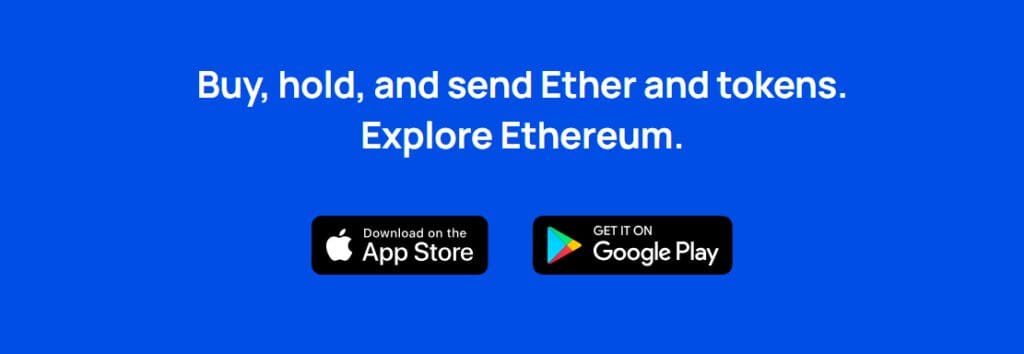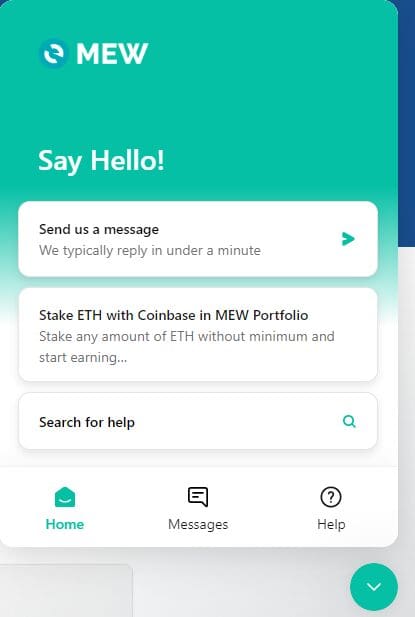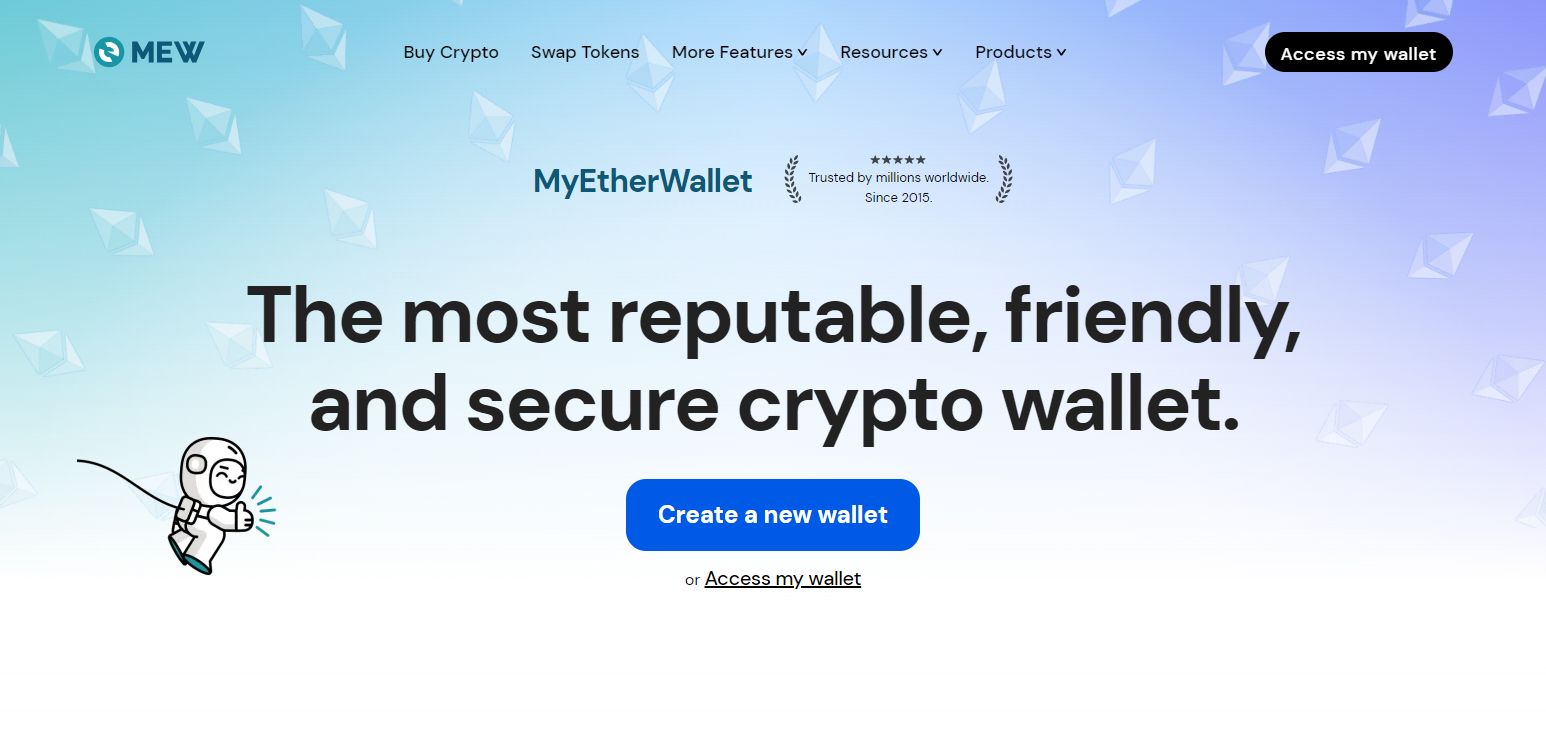This article will cover MyEtherWallet (MEW), an interface which is free, open-source and client-side, that enables users to interact directly with the Ethereum blockchain, giving access control to their crypto assets.
About MyEtherWallet
MeetherWallet (MEW) is a user friendly software that provides its users with the facilities to create and manage Ethereum wallets. Founded by specialists of blockchain, MEW is operational around the world, thus giving easy and safe access to the digital assets.

There is a simple and secure way to store, mange, and transact Ethereum based tokens through MEW. Being decentralized, it is perfect for individuals, developers, and businesses who focus on security and privacy.
With MEW, users can manage their assets without the need of running a complete Ethereum node or needing additional software. MEW can be accessed from its official website or even runs on computers where it is stored locally. MEW provides flexibility and usability at its finest.
MeetherWallet Overview
| Feature | Description |
|---|---|
| User-Friendly Interface | MEW offers an intuitive and straightforward interface, making it accessible for both beginners and experienced users to manage Ethereum and ERC-20 tokens. |
| Non-Custodial Wallet | Users retain full control over their private keys, ensuring complete ownership and security of their funds. |
| Comprehensive Token Support | Supports ETH and all ERC-20 tokens, allowing users to manage a diverse range of assets within a single platform. |
| Built-in Token Swap | Enables direct exchange of cryptocurrencies within the wallet through integrated decentralized partners, eliminating the need for third-party exchanges. |
| Hardware Wallet Integration | Compatible with major hardware wallets like Ledger and Trezor, providing enhanced security through offline key storage. |
| Staking Capabilities | Allows users to stake their ETH directly from the wallet, earning rewards while contributing to network security. |
| DApp Browser | Includes a decentralized application browser, enabling interaction with various Ethereum-based DApps directly from the wallet |
| ENS Integration | Supports the Ethereum Name Service, allowing users to associate human-readable names with their wallet addresses for easier transactions |
How does MyEtherWallet work?
MyEtherWallet (MEW) serves as an Ethereum wallet generator that lets users create and manage wallets without any necessary constraints. MEW does not keep or manage any user information or private keys on its servers, unlike other online wallets.
MEW’s wallet features are created locally on your device, so users maintain total control. For enhanced privacy, users can store private keys on a computer or as a paper wallet, although offline storage is the best option.
Your responsibility is to keep your private key safe, as MEW does not keep them on record. MEW is unable to recover your key should you lose it.
Easy on the Eye and Intuitive interface
MEW’s interface is user-centric with simple features that can be utilized by beginners and still has advanced settings for more skilled users.
- When making a wallet, it is incredibly simple because there are reminders that ensure the saving and protection of the private keys.
- Users are only required to give the following details while completing a transaction:
- Amount to send
- Recipient’s address
- Gas fee (The fee of transaction)
How To Open a MyEtherWallet Account
MEW provides three options to open an Ethereum wallet:
MEW Wallet App – A mobile application meant for safe wallet creation and management.
Keystore/JSON File: A method storing files and requires a password.
Mnemonic Phrase – A group of words which helps retrieve the wallet in case it has been lost.
For security, it is advisable that hackers have full access to your funds, thus, MEW strongly recommends using the MEW Wallet App as it might be harmful to lose the mnemonic phrase or Keystore file.
How To Creating a Wallet with the MEW Wallet App
Install MEWconnect from Google Play or the Apple Store.
Tap on the icon to launch the app and click on “Create New Wallet.”
Enter your password, confirming it and ensuring it is both strong and unique.
Click on “Start Using MEWconnect.”
You have successfully created a new Ethereum Wallet! An address for the wallet will be unique without any color codes assigned.
Backing Up Your Wallet
On your wallet’s homepage, select ‘Back Up.’
Click on “Back Up Now.”
Using a piece of paper, securely document the seed phrase (ones which are usually used for recovering the wallet).
To ensure that there is no distortion, carry out the seed word verification test.
It’s always necessary to keep the seed phrase safeguarded as it is the foremost option to recover the wallet if misplaced. Thus, never opting to share or digitally storing it is advisable.
How to Add a Token to MyEtherWallet
To incorporate an ERC-20 token to MEW:
- Access MEWconnect or the MEW website.
- Choose “Unlock Your Wallet.”
- Attend to “View Wallet Info.”
- In the section titled “Token Balances,” select “Add Custom Token.”
- Fill in the required fields Token Contract Address, Token Symbol, and Decimals (can be obtained from other Ethereum explorers such as Etherscan).
How to Make Payments With MyEtherWallet
Start by opening the MEW app or website and click on “Send Ether & Tokens.”
Access your wallet through your preferred method.
Input the recipient’s wallet address in the “To” section.
Indicate how much ETH or tokens you would like to send.
Choose the appropriate gas fee (transaction high fees allows quicker transactions).
Always finalize by check everything before clicking confirm as transfers cannot be undone.
Confirm by clicking “Generate Transaction.
Transaction speed varies due to congestion and courtesy of the gas fee and its values.
MyEtherWallet (MEW) Product
| Product | Description | Key Features |
|---|---|---|
| MEW Web | Browser-based interface for Ethereum wallet management. | – Create & access wallets – Send & receive ETH & ERC-20 tokens – Swap cryptocurrencies – Interact with DApps & DeFi services – Add custom tokens |
| MEW Wallet App (Recommended) | Mobile app for secure wallet management on iOS & Android. | – Secure wallet creation & backup – Biometric authentication – WalletConnect for DApps – Token swaps & staking – Enhanced security features |
| MEWconnect Protocol | Secure bridge between MEW Wallet App and MEW Web. | – Encrypted transactions – No exposure of private keys – Safe DApp interactions |
| Hardware Wallet Support | Integration with Ledger, Trezor, and other hardware wallets. | – Cold storage security – Direct transaction signing – Enhanced protection against hacks |
| Offline Wallet Generation | Feature for creating and storing wallets offline. | – Maximum security – Protects against phishing & hacking – Ideal for long-term storage |
| MyEtherWallet Browser Extension (Upcoming) | Secure Ethereum transactions from a browser extension. | – Quick access to wallet – Safe online transactions – Improved accessibility |
What Kind of Cryptocurrencies do they Support?
MyEtherWallet is an Ethereum-centered wallet therefore all of its listed tokens are firstly Ethereum-oriented. The wallet has the capability to store Ethereums, ERC-20 tokens, and NFTs (crypto collectibles).
MEW also enables users to trade ETH for BTC through their partner service, Bity. However, the user is required to provide another wallet where the Bitcoin can be sent after the exchange.
Some of the few tokens that are supported by MEW are the following:
- Ethreum
- Augur
- DAI
- USDT
- TUSD
- Maker
- Golem
- Status
- Chainlink
- OmiseGO
Supported Operating Systems

MyEtherWallet can be accessed through a web browser on any desktop system, whether it is Windows, Linux, or MacOS. The mobile apps are equally available for Android and Apple smart phones.
MyEther Wallet Fees
MyEtherWallet, or MEW, is a no cost open-source software. The platform allows you to create and manage wallets, send and receive transactions, as well as interact with DApps, all free of charge. But when using MEW for transactions on the Ethereum network, users have to pay network costs, which are referred to as “gas.”
These gas fees are paid in ETH and are used to compensate validators for processing and securing transactions on the blockchain. The gas needed will vary depending on the transaction’s complexity as well as how congested the network currently is. An example of gas fee estimate includes a standard transaction, which could take around 0.000441 ETH for gas fees.
It is also worth mentioning that MEW does not impose extra gas fees aside from the standard Ethereum network gas fees, which is a common practice in MEW. Users may change the gas fees while using MEW and opt for higher ones so their transaction will be processed quicker.
MEW does integrated staking services whereby users can receive rewards when they participate in the processes of validating the network. The details of the staking rewards, as well as fees enabled for withdrawal, depend on the method of staking and the condition of the network.
MyEtherWallet (MEW) Market Differentiators & Benefits
| Market Differentiator | Benefits |
|---|---|
| Self-Custodial Wallet | Users have full control over their private keys and digital assets, ensuring financial independence and decentralization. |
| Open-Source and Audited | Transparent, community-driven development with regular security audits to enhance user safety and trust. |
| User-Friendly Interface | Intuitive design makes it easy for both beginners and experienced users to navigate and manage their crypto. |
| Comprehensive Token Support | Supports a wide range of ERC-20 tokens, allowing users to manage their entire Ethereum-based portfolio in one place. |
| DApp Integration | Enables seamless access to decentralized applications (DApps) and DeFi services, expanding functionality beyond simple transactions. |
| Cost-Effective Solution | Free to use with no fees for wallet creation, transactions, or DApp interactions, reducing costs for users. |
What makes MEW a good choice?
Crypto veterans since 2015 2015
MEW is the world’s first and one of the most trusted Ethereum and L2 wallets.
Private
They don’t track any personally identifiable information, account addresses, or asset balances.
Hardware wallet support
They support all major hardware wallets including Ledger and Trezor in MEW web portfolio and Enkrypt.
Secure and transparent
Independently audited in Bug Bounty program on HackenProof and, previously, HackerOne.
Self-custody
You and only you are in control of your assets. Your keys, your crypto.
Easy to use
Get started in minutes, no prior knowledge needed.
Is MyEtherWallet safe?
MyEtherWallet provides users with various options when it comes to security. Your account is protected by a password and a private key, which is created at the moment of account registration. You should consider keeping this key in a safe offline storage place because backup is highly recommended.
It is safe so long as you do not save the private keys created for you on your computer. Hardware wallets such as Ledger Nano S and Trezor also add to the security of MyEtherWallet.
These kinds of hardware wallets are well known to be resistant to phishing, viruses, and keyloggers. Just make sure you have a spare backup key which can be kept in a different location from the first one.
As an alternative, you can also make use of MetaMask, which is a free extension for browsers supporting Ethereum that helps unlock MyEtherWallet with ease. This de-facto wallet extension even warns you when accessing phishing sites which are unfortunately way too common.
MyEtherWallet Pros & Cons
Pros
Free & Open Source – MEW is a free open source wallet that permits complete control over private keys to the user.
User Control – MEW does not hold private keys so users automatically have complete control over their funds, unlike centralized wallets.
Supports Multiple Access Methods – Users can connect via Ledger or Trezor hardware wallets, MEW Wallet app, Keystore files, and even private keys.
ERC-20 Token Support – Capable of managing Ethereum based tokens and enables manual addition of custom tokens.
Decentralized & Secure – MEW’s lack of user data storage means decrease in centralized breaches.
DApp & DeFi Access – Users can engage with decentralized applications (DApps), stake ETH, and swap tokens straight away.
Offline & Paper Wallet Support – Enables setting up wallets offline for users who seek additional privacy.
Cons
Not a Hosted Wallet – MEW does not have account recovery so users need to securely save their private keys.
Security Risks for Uninformed Users – Funds are irrecoverable if private keys or mnemonic phrases are lost or exposed.
Phishing & Scam Risks – Common problem for MEW users where fake MEW websites, phishing and scam attacks teem, hence caution with URL is a must.
No Built-in Two-Factor Authentication (2FA) – MEW, unlike custodial wallets, does not employ 2FA protection.
Requires Gas Fees – Fees on the Ethereum network are charged, and these fees tend to be expensive when there is congestion on the network.
Using MyEtherWallet to Increase Your Control Over Cryptocurrencies
Ideal for individual users and businesses alike, MyEtherWallet is a cryptocurrency wallet that provides high levels of security, convenience, and flexibility. Though it doesn’t work for everybody, MyEtherWallet serves its purpose for those looking for more control over their digital assets.
At the end of the day, whether you choose MEW or another software wallet should be determined by your needs and preferences. Here at TEC, we’ve spent the last 30 years advising clients on which software solutions are best suited to achieving their goals. If you’re thinking about MEW or any other crypto wallet, they have impartial experts who will help you make the right choice.
Customer Support
The MyEtherWallet website contains a Knowledge Base which is updated regularly and includes an FAQ section covering the most frequent inquiries.

Users can also reach out to the customer care team by sending an email to support@myetherwallet.com. Currently, the platform lacks live chat and phone support.
After a cursory search of the MyEtherWallet Facebook page, it appears that the consensus regarding MyEtherWallet customer support is – “highly effective and helpful”, with “nothing but positive things” further elucidating the sentiment.
Conclusion
In conclusion, MyEtherWallet (MEW) serves as a solid wallet for Ethereum and ERC-20 token holders due to its ease of use. It allows the users to control their own keys which enhances security.
Its user-friendly interface accompanied by hardware wallet supports and DApp caters to novice and advanced crypto users alike. MEW’s transparency and focus on empowering users makes it one of the most trusted wallets in the Ethereum Ecosystem.










